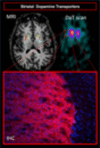Polymorphism of the dopamine transporter type 1 gene modifies the treatment response in Parkinson's disease
- PMID: 25805645
- PMCID: PMC5963414
- DOI: 10.1093/brain/awv063
Polymorphism of the dopamine transporter type 1 gene modifies the treatment response in Parkinson's disease
Abstract
After more than 50 years of treating Parkinson's disease with l-DOPA, there are still no guidelines on setting the optimal dose for a given patient. The dopamine transporter type 1, now known as solute carrier family 6 (neurotransmitter transporter), member 3 (SLC6A3) is the most powerful determinant of dopamine neurotransmission and might therefore influence the treatment response. We recently demonstrated that methylphenidate (a dopamine transporter inhibitor) is effective in patients with Parkinson's disease with motor and gait disorders. The objective of the present study was to determine whether genetic variants of the dopamine transporter type 1-encoding gene (SLC6A3) are associated with differences in the response to treatment of motor symptoms and gait disorders with l-DOPA and methylphenidate (with respect to the demographic, the disease and the treatment parameters and the other genes involved in the dopaminergic neurotransmission). This analysis was part of a multicentre, parallel-group, double-blind, placebo-controlled, randomized clinical trial of methylphenidate in Parkinson's disease (Protocol ID:2008-005801-20; ClinicalTrials.gov:NCT00914095). We scored the motor Unified Parkinson's Disease Rating Scale and the Stand-Walk-Sit Test before and after a standardized acute l-DOPA challenge before randomization and then after 3 months of methylphenidate treatment. Patients were screened for variants of genes involved in dopamine metabolism: rs28363170 and rs3836790 polymorphisms in the SLC6A3 gene, rs921451 and rs3837091 in the DDC gene (encoding the aromatic L-amino acid decarboxylase involved in the synthesis of dopamine from l-DOPA), rs1799836 in the MAOB gene (coding for monoamine oxidase B) and rs4680 in the COMT gene (coding for catechol-O-methyltransferase). Investigators and patients were blinded to the genotyping data throughout the study. Eighty-one subjects were genotyped and 61 were analysed for their acute motor response to l-DOPA. The SLC6A3 variants were significantly associated with greater efficacy of l-DOPA for motor symptoms. The SLC6A3 variants were also associated with greater efficacy of methylphenidate for motor symptoms and gait disorders in the ON l-DOPA condition. The difference between motor Unified Parkinson's Disease Rating Scale scores for patients with different SLC6A3 genotypes was statistically significant in a multivariate analysis that took account of other disease-related, treatment-related and pharmacogenetic parameters. Our preliminary results suggest that variants of SLC6A3 are genetic modifiers of the treatment response to l-DOPA and methylphenidate in Parkinson's disease. Further studies are required to assess the possible value of these genotypes for (i) guiding l-DOPA dose adaptations over the long term; and (ii) establishing the risk/benefit balance associated with methylphenidate treatment for gait disorders.
Keywords: Parkinson’s disease; cognitive disorders; levodopa; methylphenidate; pharmacogenetics.
© The Author (2015). Published by Oxford University Press on behalf of the Guarantors of Brain. All rights reserved. For Permissions, please email: journals.permissions@oup.com.
Figures


References
-
- Bergersen L, Gauvreau K, Marshall A, Kreutzer J, Beekman R, Hirsch R, et al. Procedure-type risk categories for pediatric and congenital cardiac catheterization. Circ Cardiovasc Interv 2011; 4: 188–94. - PubMed
-
- Berry MD, Juorio AV, Li XM, Boulton AA. Aromatic L-amino acid decarboxylase: a neglected and misunderstood enzyme. Neurochem Res. 1996;21:1075–87. - PubMed
-
- Białecka M, Droździk M, Kłodowska-Duda G, Honczarenko K, Gawrońska-Szklarz B, Opala G, et al. The effect of monoamine oxidase B (MAOB) and catechol-O-methyltransferase (COMT) polymorphisms on levodopa therapy in patients with sporadic Parkinson's disease. Acta Neurol Scand. 2004;110:260–6. - PubMed
-
- Białecka M, Kurzawski M, Klodowska-Duda G, Opala G, Tan EK, Drozdzik M. The association of functional catechol-O-methyltransferase haplotypes with risk of Parkinson's disease, levodopa treatment response, and complications. Pharmacogenet Genomics. 2008;18:815–21. - PubMed
-
- Chaudhuri KR, Schapira AH. Non-motor symptoms of Parkinson’s disease: dopaminergic pathophysiology and treatment. Lancet Neurol. 2009;8:464–74. - PubMed
Publication types
MeSH terms
Substances
Associated data
LinkOut - more resources
Full Text Sources
Other Literature Sources
Medical
Molecular Biology Databases
Miscellaneous

